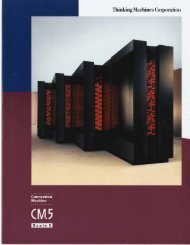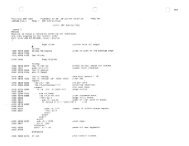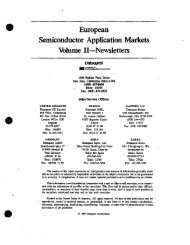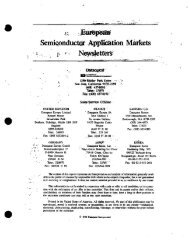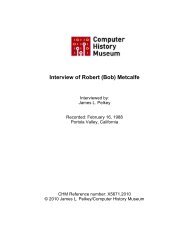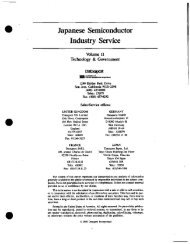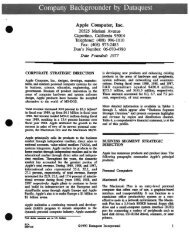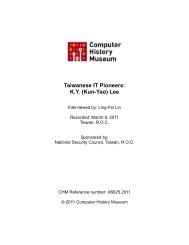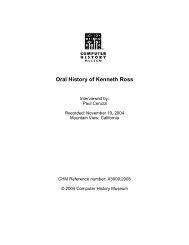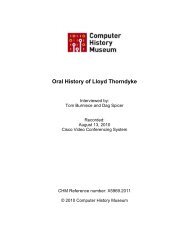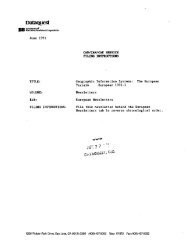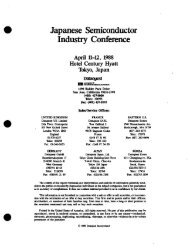Oral History of Robert Everett - Computer History Museum
Oral History of Robert Everett - Computer History Museum
Oral History of Robert Everett - Computer History Museum
Create successful ePaper yourself
Turn your PDF publications into a flip-book with our unique Google optimized e-Paper software.
<strong>Oral</strong> <strong>History</strong> <strong>of</strong> <strong>Robert</strong> <strong>Everett</strong><br />
there’d be a problem, and a decision would have to be made among alternatives. And we’d do all the<br />
homework, and then we’d come in to this 100 people, 100 man meeting, and we’d describe the<br />
alternatives and the pluses and minuses, and how we wanted it, what we thought ought to be done. And<br />
they’d accept. We figured out the major reason they would accept is that none <strong>of</strong> them wanted to be held<br />
responsible for what was going on if they didn’t. They held us responsible, and that was fine. We were<br />
happy to be responsible. Somebody had to be responsible.<br />
Hendrie: Exactly.<br />
<strong>Everett</strong>: You can’t…this isn’t the U.S. Congress. Anyway, lots <strong>of</strong> fun.<br />
Hendrie: Tell me a little bit about the communications side <strong>of</strong> this. Obviously, lots <strong>of</strong> digital data going<br />
over telephone lines and presumably eventually had to go over the air to the – probably not initially – the<br />
interceptors were voice controlled initially?<br />
<strong>Everett</strong>: They were also data links, which Lincoln was involved with.<br />
Hendrie: There were data links? So you could send digital data to the aircraft, even in the earliest<br />
versions <strong>of</strong> the system?<br />
<strong>Everett</strong>: There were a couple <strong>of</strong> different communications systems that the Air Force had. So, well, it was<br />
obvious that it had to go over the telephone lines.<br />
Hendrie: What was the state <strong>of</strong> the art for doing that?<br />
<strong>Everett</strong>: There wasn’t any, really. So we, the first thing we did was we had to get a telephone line so we<br />
could do some experiments. So we ordered a telephone line and the telephone company came in and put<br />
the line in, and then they had a handset. And we said, “We don’t need the handset.” They said, “Sorry,<br />
every telephone line comes with a handset.” Anyway, so we built our own digital modems; as I<br />
recall a lot <strong>of</strong> that was done by Jack Harrington. And so then we had to learn about telephone lines. There<br />
was a question about what kind <strong>of</strong> data rates you could get. Also it turned out that the telephone lines had<br />
a lot <strong>of</strong> switching transients in them which didn’t bother people who were talking on them, but it sure<br />
bothered when you sent bits over them. So we had to work with the telephone company to fix these lines<br />
so they didn’t have these sharp signals on them. That had to be done. And at the time <strong>of</strong> SAGE, they were<br />
all special lines because…<br />
Hendrie: They all had to be conditioned this way.<br />
<strong>Everett</strong>: Now, we were getting, I don’t know, 1800 bits per second or something across these lines, which<br />
<strong>of</strong> course is nothing at all today.<br />
CHM Ref: X3877.2007 © 2007 <strong>Computer</strong> <strong>History</strong> <strong>Museum</strong> Page 35 <strong>of</strong> 56



